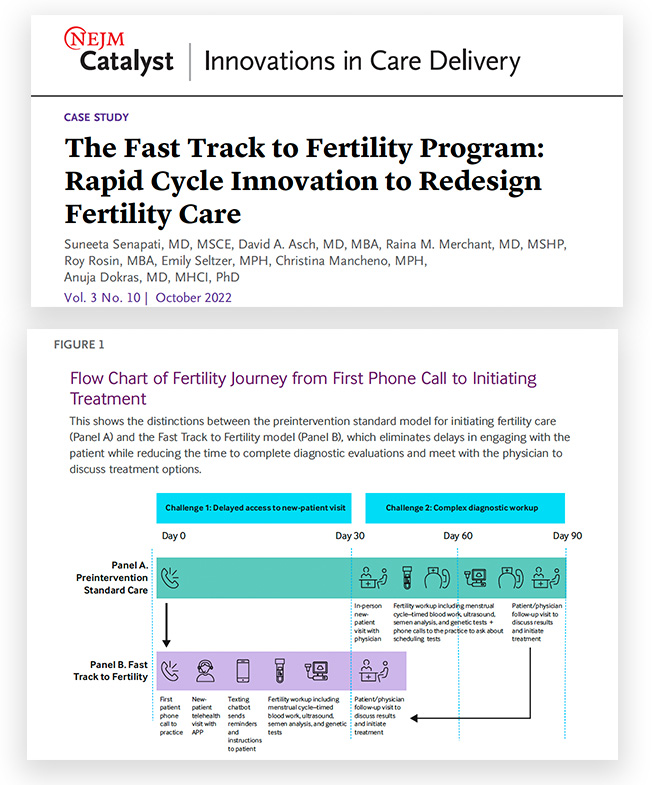Spotlight on: Anuja Dokras

Professor of Obstetrics and Gynecology
Executive Director, Women's Health Center for Clinical Innovation
Professor of Obstetrics and Gynecology, University of Pennsylvania Perelman School of Medicine
Executive Director, Women's Health Center for Clinical Innovation, Penn Medicine
"I'm always seeking something new and different, not shying away from the forks in the road," says Anuja Dokras, a Penn professor who specializes in reproductive endocrinology and infertility. Guided by her adventurous spirit, Dokras has embraced career shifts and opportunities over the years. Her work now spans a multitude of responsibilities, including treating patients, overseeing translational research, advising trainees and colleagues, and directing two centers at Penn Medicine.
One of those centers is the Women's Health Center for Clinical Innovation (WHCCI), created in 2021 to support a growing array of initiatives advancing care for women. Currently, there are 15 active projects in the WHCCI portfolio spanning many areas of women's health. Several of these projects predate the Center's founding and are collaborations with the Center for Health Care Innovation (CHCI), such as Heart Safe Motherhood, a postpartum hypertension monitoring program that leverages text messaging to reduce readmissions and improve patient outcomes. Another, Fast Track to Fertility – on which Dokras is a co-physician lead – uses a reimagined workflow and automated reminders to dramatically reduce fertility workup wait times.

Before Fast Track to Fertility, couples had to wait three to four months to begin treatment because of workup logistics and limited physician capacity, says Dokras. "To improve access, we thought, 'Why does a patient have to wait to get an appointment with a doctor? Can one of our nurse practitioners see them sooner, order all their tests, and then engage the physician?' It was a complete change in mindset. Access is now a priority for our health system, and one of the strategies Penn Medicine is using to get patients in sooner is the model that we validated in Fast Track to Fertility. We call it 'moving the front door.'"
"Anuja is not only an expert clinically but also has the passion to dramatically improve how we deliver care," says Roy Rosin, chief innovation officer at Penn Medicine, who advised the Fast Track to Fertility team through the Innovation Accelerator Program. "She brought deep insights into the problems and opportunities as well as an interest in experimenting, testing, and rapidly validating hypotheses and iterating as needed. That makes her a skilled innovation leader as well as a skilled clinician."
It was years earlier that Dokras was first exposed to innovation methodologies. "CHCI staff had come to observe some of our workflow processes in the Division of Reproductive Endocrinology, and I was just so impressed by how they evaluated our current state, suggested some rapid cycles of experimentation, and then implemented them," she recalls. Recognizing how impactful an innovation approach could be and wanting to learn more, she first took courses during her sabbatical and then earned a master's degree in health care innovation from Penn.
“Anuja is not only an expert clinically but also has the passion to dramatically improve how we deliver care.” – Roy Rosin
"I am a constant learner," says Dokras. "I think it's so exciting. The world changes so rapidly – every decade, there's something new and, often, disruptive! There's nothing stagnant. And in order to break down the barriers and excel in these newer fields, I thought more formalized training would help me push the field forward."
Under Dokras' leadership, education is a significant piece of the WHCCI mission alongside its clinical care and research components. The Center offers medical students and trainees opportunities to observe and participate in ongoing innovation projects focused on process innovation to offer high-value and equitable care at the Department of Obstetrics and Gynecology. Advising is available to Center members through one-on-one and group sessions. And project leaders share their work with the department at grand rounds, across Penn Medicine through WHCCI's seminar series, and more broadly through scholarly publications and presentations at national meetings.
Another part of innovation literacy is staying informed about available products – and with the advent of so many health apps and other digital technologies, there is plenty to keep up with. "Femtech is a burgeoning space, and a lot of these products are being targeted directly to consumers. If we, the providers, are not part of that conversation, there can be challenges, and I think our patients need advocates. Partnerships with trained clinicians in the innovation space are important," says Dokras.
An international expert in polycystic ovary syndrome (PCOS), Dokras also directs the Penn PCOS Center and leads NIH-funded clinical trials testing therapies for PCOS. She is active nationally and internationally in patient support organizations and a medical society for PCOS, serving on a scientific advisory board, working to increase awareness of the condition, and promoting policymaking that benefits these patients. Dokras recently received the International Advocacy Leadership Award from PCOS Challenge, a patient support group with more than 55,000 members, in recognition of her efforts.
Of the many roles she has, advocacy is one of two that currently stand out for Dokras; the other is mentorship. "That's really big for me at this phase in my career – to help and support the next generation," she says. "And that's part of why I proposed founding the WHCCI. It wasn't to focus on a couple of projects; it was more to help everyone in this space and our department to succeed."